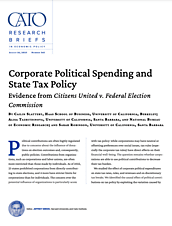Political contributions are often highly regulated due to concerns about the influence of donations on election outcomes and, consequently, public policies. Contributions from organizations, such as corporations and labor unions, are often more restricted than those made by individuals. As of 2022, 23 states prohibited corporations from directly contributing to state elections, and 4 more have stricter limits for corporations than for individuals. The concern over the potential influence of organizations is particularly acute with tax policy: while corporations may have neutral or offsetting preferences over social issues, tax rules (especially the corporate tax rules) have direct effects on their financial well-being. The question remains whether corporations are able to use political contributions to decrease their tax burden.
We studied the effect of corporate political expenditures on state tax rates, rules, and revenues and on discretionary tax breaks. We identified the causal effect of political contributions on tax policy by exploiting the variation caused by Citizens United v. Federal Election Commission in corporations’ ability to spend on elections. In January 2010, the Supreme Court overturned a 20-year precedent and prohibited governments from restricting independent political expenditures by organizations. The ruling allowed corporations, unions, and other organizations to make unlimited independent contributions (i.e., expenditures on activities aimed at supporting candidates that are not given directly to election campaigns). At the time of the decision, 23 states had laws banning corporations from spending in state elections. These bans were effectively canceled, meaning that corporations were free to spend in elections where they had previously been constrained. This ruling allowed us to compare tax policy outcomes in states that were affected by the 2010 ruling with those that were not.
The Citizens United decision was highly controversial, and its critics warned of devastating impacts from independent spending by corporations. At the time of the ruling, the editorial board of the New York Times wrote that it “paved the way for corporations to use their vast treasuries to overwhelm elections and intimidate elected officials into doing their bidding.” President Barack Obama also criticized the ruling, declaring it “a major victory for big oil, Wall Street banks, health insurance companies and the other powerful interests that marshal their power every day in Washington to drown out the voices of everyday Americans.”
Past research has shown that the Citizens United ruling was followed by a substantial increase in independent spending. Therefore, we took the increase in corporate political spending as established knowledge and studied the effect of the ruling on tax policy outcomes. Taxes are important to corporations—they are in the top three issues companies spent money lobbying on in each year of the past decade. Our main analysis considered multiple tax outcomes: tax rates and base rules, discretionary tax breaks, and tax revenues. We focused on three tax rates: the top corporate tax rate, the top personal income tax rate, and the sales tax rate. Reductions in the top corporate and top personal tax rates would be beneficial to corporations and their high-income owners. Lower sales tax rates are good for business through their effect on the demand for goods. Corporations may also support changes in less-salient tax rules, which can be just as financially beneficial. For this reason, we also studied the effects on other corporate tax features: the investment tax credit, the number of years allowed for loss carryforward, and the sales apportionment weights.
Beyond changing tax policy, firms may be able to use contributions to support politicians who, in return, offer them firm-specific tax breaks. After all, lowering the corporate tax rate has immediate revenue consequences that are salient to voters. In contrast, firm-specific tax breaks are often viewed as a job creation policy and have revenue consequences that are realized in the future, making such tax deals more popular with voters. For this reason, in addition to tax policy outcomes, we studied the effect of the Citizens United ruling on discretionary tax breaks from 2002 to 2017. Finally, we also considered whether the Citizens United ruling led to changes in overall tax revenues, as small changes across many dimensions of tax policy could add up to substantial effects.
We compared the 21 states that enacted contribution bans before 2000 with the 27 states that did not enact bans prior to 2010. Across all outcomes, we found no effects of Citizens United on tax policy. For corporate tax rates and revenues, the results suggest a small effect in the decade after the decision. Corporate tax rates in states that had contribution bans overturned are 2 percent lower from 2010 to 2015 and 9 percent lower from 2015 to 2020 (5 percent lower on average). We found a similarly sized estimate for corporate tax revenue. However, we found no effects of the Citizens United ruling on income tax rates or sales tax rates and revenues, investment tax credits or other tax rules, or the frequency or magnitude of firm-specific discretionary tax breaks. We supplemented our analysis by studying the introduction of independent expenditure bans prior to Citizens United and found no effect of the bans on tax policy outcomes.
Despite the fear that Citizens United would unleash corporate interests, our results suggest that independent corporate expenditures are unlikely to substantially drive tax policies. Of course, we cannot conclude that corporate political influence has no effect on other pro-business regulations. However, significantly lower taxes, an objective that unifies corporations of all types, were not realized in the wake of the Supreme Court ruling. One explanation for this could be that the companies with the most potential influence are multinational corporations that already avoid most state and local tax burdens. Alternatively, tax policy may not have changed after the Citizens United decision because independent expenditure bans did not limit corporate influence in the first place.

This work is licensed under a Creative Commons Attribution-NonCommercial-ShareAlike 4.0 International License.
